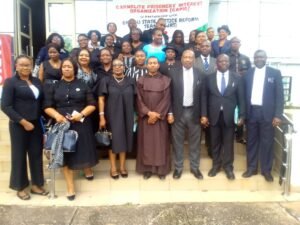By Flowerbudnews
The Chief Judge of Enugu State, Justice Raymond Ozoemena, has assured full implementation of non-custodial sentences through community service sentences to check decongestion in custodial centres in the state.
Ozoemena said this on Monday in Enugu at the “Unveiling of the Operational Framework for Community Service Sentences in Enugu State” and “A Workshop for Judges and Magistrates on Implementation of Community Service Sentences in Enugu State Justice System”.

The workshop was organised by Carmelite Prisoners Interest Organisation (CAPIO) in partnership with the Enugu State Justice Reform Team (ESJRT).
Ozoemena, represented by Justice Anthony Onovo, said that judges and magistrates of the state were eager to commence the implementation and sentencing of minor offenders to community service sentences that would run between a day and a few months.
According to the chief judge, it will be fully implemented; while the state judiciary and state government will be backing and providing all resources necessary for it to succeed in the state.
“We laud CAPIO and the ESJRT for stepping up and providing the guide-line, which is the Operational Framework for Community Service Sentences in Enugu State unveiled today.
“We also thank them for the engagement of various stakeholders for its implementation.

“We have mapped out programmes and actions to ensure it works.
“We are providing a temporary cell within the high court premises, provision of offices for non-custodial officers and we will also liaison with the office of the state attorney general to see to its smooth implementation,” he said.
The chief judge commended Gov. Peter Mbah for doing much to ensure that the judicial system was given due attention to improve justice delivery within the state.
The Executive Director of CAPIO, Rev. Fr. Jude Isiguzo, commended the Enugu State Judiciary for its commitment to ensure implementation of non-custodial sentencing through the Community Service Sentences.
Isiguzo noted that the workshop and unveiling of the Operational Framework for Community Service Sentences in Enugu State was to ensure that judges and magistrates that would be doing the sentencing clearly understand all about it.
He said, “They need to understand the reasons behind sentencing minor offenders to community service sentencing to decongest custodial centres, help to rehabilitate the offender and for the offender to acknowledge that offence is not beneficial.
“For instance, once an offender is sentenced to community service between a day to six months either to cut grasses, keep a public place clean or provide other community services, it will act as deterrent to others in his home and community.
“After he must have served through his or her sentence within his community, he or she will definitely realise that taking to crime brings shame,” he said.
Speaking, Justice C.I. Nwobodo of the Enugu State High Court, noted that non-custodial sentencing had been in the law of the state for ages, but the resources and provisions to make it work had prevented its implementation until now.
Nwobodo appreciated CAPIO for coming around to ensure it is implemented to the latter.
She noted that CAPIO had provided training for various stakeholders on the community service sentences and made other provisions to support the hitch-free take-off and success of community service sentences in the state.
“CAPIO has provided training for community service sentence officers in ministries, departments and agencies and today, it is for judges and magistrates to get engaged with the document of the Operational Framework for Community Service Sentences.
“We also have a need for more functional bolster homes or juvenile homes so that juveniles will be reformed and they have no business going to correctional centres to mix with hardened criminals,” she said.
Over 50 judges and magistrates from the Enugu State Judiciary Service attended the workshop and made inputs on the document of the Operational Framework for Community Service Sentences unveiled to them.





